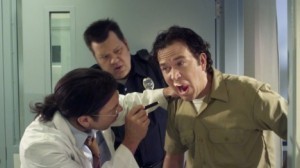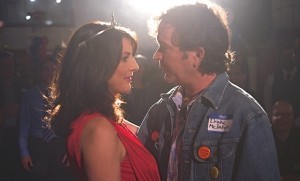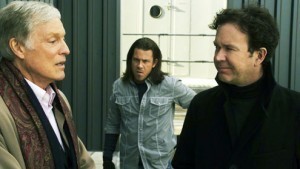Leverage Sunday: The Inside Job: Integrating Back Story
So remember Leverage Sundays? Yes, I finally found the third season disks, got the DVD player hooked up again, and finished the laundry. You don’t want to know about the laundry. Okay, 14 dryers full at the laundromat. The big dryers. Note to self: do laundry more than twice a year. Where were we? Right. Leverage Sundays. Pretend it’s Sunday. I have to put up a different post this Sunday anyway because it’s an international holiday (two international holidays) so you’re getting Leverage-Today-Is-Sunday-Because-I-Said-So.
So . . .
Leverage’s Season Three turned in a different direction: Nate’s in jail, the team has bonded in his absence, and now they’re determined to break Nate out and get things rolling again. But Nate refuses, saying he’s broken the law and he’ll serve his time. Then a mysterious Italian woman shows up and promises Nate his freedom if he’ll agree to go after arch criminal Damian Moreau; if he refuses, she’ll have him deported to rot in an Italian prison and she’ll have his team killed. This would be a lot more effective if the actress giving the threat wasn’t the worst actor I’ve ever seen on network TV, but she doesn’t have a lot of onscreen time and it’s Leverage, so roll with it.
In “The Jailhouse Job,” Nate defeats a corrupt prison owner and his goon guards, after which the Mysterious But Terrible Italian Actress gets him a get-out-of-prison-free card that can be revoked at any time if he doesn’t go after Moreau, and we’re back in business.
That’s followed by “The Reunion Job,” which is fun, but creaks in places, although it’s worth it just to see Tim Hutton in socks and flip flops playing a pool guy; the real story arc here is that the team is back and settling into their old roles with one important change: Sophie’s been in charge while Nate’s been gone, and he’s come home to a family who sees him as one of the gang now, not the Fearless Leader. They’ll still follow him, but they’re gonna ask some questions. This episode also teases both the Sophie/Nate romance and the Parker/Hardison romance, but they’re going to draw both of those out for so long that the Sophie/Nate tango becomes more of a drag, so I’ll wait until they actually do something interesting with romance-within-community to talk about that.
Then comes “The Inside Job” and the first of Season Three’s back-story-heavy plots.
One of the drawbacks to writing a community story is that there are so many people that the focus gets diffused: everybody gets a little bit of time but nobody gets real development. Leverage worked around this by emphasizing different characters in their episodes so that by the end of the series, all five had achieved significant character growth. Parker, however, is the character whose arc is the most fun to follow because she changes from a character who is a disconnected id into a fully functioning human being with strong emotional ties to others. In fact, by the end of the last episode, Parker has changed from a feral child to the spokesperson of the Leverage organization. So at the midpoint in the third of five seasons, Parker gets “The Inside Job” to show how much she’s integrated, not only into the team, but to the world in general. She’s still nuts, but she’s much better at faking sane.
So let’s talk about back story for a minute. Back story is anything that happens before the first page/frame of a story. The vast majority of it lies beneath surface, never to appear on the page, or at least it does if you’re doing it right. As authors we know all of the back story, every little thing that ever happened to our characters, and we really really really want to tell the reader all of that because it’s so interesting. Meanwhile, the reader just wants the damn story. The best advice I can give on writing back story is to not write back story; just write the story in the now, hand it to a beta reader, ask her what she doesn’t understand, and figure out a way to get that into the now of the action. If you have a scene where your character stares out a window and thinks about her life, cut it. If you have a scene where your character and another character chat about the past (no conflict), cut it. If your character finds a diary or a letter that explains something from the past, for the love of god, cut that, shred it into ribbons and then bury it in the backyard. (No reader every said, “Wow, that letter was really exciting.” Especially if it’s in French; I’m looking at you, Dorothy Sayers.)
But you have back story and it’s really important so how are you going to get it on the page? Figure out why it’s important now, why that part of her history has come back to haunt her now, why some character from her past has come back to screw up her life now, and then tell the story of what’s happening now.
In Parker’s case, her old mentor is in trouble, she rushes in to save him, and he calls the team to help her when she gets in over her head. While the team works furiously to get her out and then goes in to bring down the Big Bad, Parker’s back story emerges almost entirely in the now of the story as the viewer meets Archie and sees his relationship with her in action. Even more telling is the conflict between her former surrogate father and her present surrogate father, as Archie and Nate square off, arguing about how to rescue her. They’re both criminals with shaky moral boundaries and even shakier attachment issues, but they both love Parker like a daughter, and they’ll do anything to save her. Their differences stem from the fact that Archie knows Parker as the emotionally distant and stunted child he trained, and Nate knows Parker as the skilled woman who’s part of his family, and their two views of her combine to make a vivid dimensional portrait of a fascinating woman.
Meanwhile Parker is loyal to both fathers, working with one to save the other while she deals with an AI security system, Eliot yelling at her through a window, and a sociopathic businesswoman who intends to shoot her. Parker’s passionate need to save Archie even if it means her own death tells us all we need to know about how much he really did save her. Her understanding of why he never took her home illuminates why she doesn’t connect, and her walk away from Archie with Nate at the end brings home that she’s not alone any more, she has family and connections and everything she was cheated out of as a child. The episode is fast-paced, full of action, a great caper story, and it shows Parker’s character arc without ever being about Parker’s character arc. Almost every bit of her history is illustrated in the action in the now, so it never slows down the story.
Season Three goes on to showcase the rest of the team, too. The next episode, “The Scherazade Job” gives us more of Hardison’s foster home upbringing, “The Boost Job” sketches in Parker’s history as a car thief before she met Archie, “The Three Card Monte Job” brings Nate’s father in as the antagonist and pretty much shows everything we needed to know about why Nate’s such a bastard, “The King George Job” takes the team to England where Sophie’s past catches up to her, and “The San Lorenzo Job” brings to light things about Eliot’s past he would prefer stay buried. So Season Three is about the individuals who make up the team, not just where they came from but why it’s such a freaking miracle that they’ve found each other.
There’s so much about this series that is brilliant–the twisty plots, the distinct characterizations, the zippy sense of fun and the equally zippy sense of peril–but the crucial thing is how careful the show runners are to build and test and rebuild the Leverage team through their character growth. Showing through the now of the story how broken and lost they all were before they met not only reinforces how important the community is to them, it deepens our investment in the team as a whole. We need them to be together because in this season, they’re not just a fun bunch of thieves and grifters, they’re family, and we’re a vicarious part of that.
Next, one of my all time favorite TV episodes in any series, “The Rashomon Job.”








